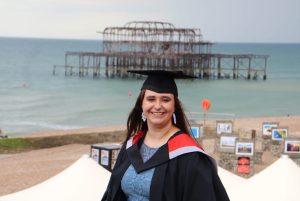Neurodiversity Celebration Week – Challenging Stereotypes and Misconceptions About Neurodiversity
This week (13-19 March) is Neurodiversity Celebration Week – a worldwide initiative that challenges stereotypes and misconceptions about neurodiversity. Neurodiversity is the term that describes the idea that there is naturally occurring variation in the human brain which can impact a series of brain functions such as how we interact with one another or how we process information. Whilst statistics vary, scientists suggest between 15-20% of us show some form of neurodivergence – and that many of us don’t even realise we are neurodivergent!

Katy is a CIEEM Qualifying Member
Katie Bilbrough is a Qualifying member of CIEEM who was diagnosed with dyslexia when she was 18. In this blog piece she speaks about her experiences of masking dyslexia, some common phrases the neurodiverse often hear to ‘explain’ their different minds, and the personal importance of her diagnosis.
“The diagnosis helped me in many ways, not just that it finally put a name to the frustrations I was having but also the fact that I was finally able to have something official to ask for help with. This was especially difficult for me when growing up as I was able to mask my dyslexia well. With many teachers commenting that I “just needed to take the time to reread my work and edit it”. My mother was over the moon when my English teacher finally rang home and asked if I’d had a test carried out before, as she’d noticed that my work consistently had grammar mistakes in it, whether it was a timed condition or not. However, when I was sent for a test at age 14, I was told that my results were odd, but that I wasn’t dyslexic. And specifically that “you have bad short-term memory but it’s okay everyone has phones now that can set reminders on” as well as “your spelling is below your age group but it’s okay, autocorrect is a thing now.
“I went on to do well with my GCSE’s and well with my A levels. However, in my first term of university I was struck with failures on all my essays. With a helpful push again from my mother, I was tested once again and this time, I was finally diagnosed. I still remember straight after my test being told “there is no certain cut off, you can be mildly dyslexic or strongly dyslexic, it does not matter by how much. As long as you gain the help needed to carry out the things you love to do in life. That is what the diagnosis is for”. The diagnosis gave me breathing space, even though I had felt ‘not dyslexic enough’ for most of my life I finally had the help and the piece of paper which I could point to whenever someone said’ I had not been applying myself enough’ and I could say “I am and I deserve more help then just you telling me to try harder”.
“I now work as an Ecologist and I feel confident in my ability to undertake my work, as well as this I am hoping that in the next year or so I will get to associate membership at CIEEM.”
Unfortunately as Katy has highlighted there remains a level of stigma around the neurodiverse, this often originates from incomplete information and unconscious biases that persist within our culture. Embracing neurodiversity reduces the stigma and encourages a better and more inclusive workplace and world for everyone. If someone asks for support with their neurodivergent abilities, they have, like Katy, probably fought uncertainty for years. Under the 2010 Equality Act, people do not need a formal diagnosis to ask for reasonable adjustments within the workplace. Adjustments will vary by the neurodivergent abilities, and requirements of the individual as well as by workplace, and work type. In the UK, the government-funded Access to Work initiative helps people with mental health and physical disabilities or challenges to find and stay in work. There are also a range of funding and support schemes in Ireland which offer practical assistance to people at all career stages.
For decades, workplaces and teams have been developed around neurotypical thinking. Here are some practical ways to support neurodiversity in your teams and organisation:
- Provide or attend training to understand neurodiversity, wider diversity and unconscious bias.
- Challenge negative conversations; it is not the sole responsibility of neurodivergent individuals to confront unhelpful comments and behaviours.
- Get to know the sunflower lanyard; it’s a discreet signal that people with neurodivergent abilities – and others – wear to indicate they may need additional support, help, space or time.
- Support confidentiality around an individual’s neurodivergence, they may have disclosed this information in confidence – if in doubt it’s always best to check! Respect your colleagues’ needs, whether or not they disclose their neurodivergent abilities.
- Pay attention to the language that people use about themselves and try to mirror it wherever possible. If in doubt, ask what terms people use and which they prefer to avoid.
- Take a sensitive approach using person-first language; people have neurodivergent abilities, they are not “neurodivergent people”. Avoid phrases such as “everyone’s on the spectrum”, “everyone has neurodivergent traits”, or “you don’t seem neurodivergent;” these can undermine an individual’s experience or play down their personal challenges.
- Be prepared to accommodate your colleagues, by:
- Providing an accessible list of reasonable adjustments that your organisation offers, especially when recruiting, and offer to discuss additional adjustments .
- Communicate flexibly; perhaps discuss tasks verbally and follow up with a clear email.
- Share an agenda before you meet to give people time to prepare themselves.
- Be inclusive; set up meetings with audio captions or record them for people to watch again to absorb what you’ve discussed.
- Spread the word about Access to Work and similar schemes. The more people know about support, the easier it is for people to apply for it.
And finally, whether you are neurodivergent or neurotypical, learn what your colleagues need and offer them kindness and support.
A quick reminder that September’s edition of In Practice will be focused on ‘Diversity, Accessibility & Capacity in the Sector’. This issue will further explore the people element of our profession. We welcome article submissions on improving diversity and inclusion in the sector, removing barriers to enter the profession and creating new routes into the sector, addressing capacity issues and skills shortages in the sector, and improving the status and standing of the profession. The deadline for submissions will be 19 May 2023.
Find Out More
To find out more about neurodiversity you can visit the Neurodiversity Celebration Week website and explore the schedule of events for the week. From introductory webinars, panel discussions and more, the range of events aims to educate and inspire conversations about neurodiversity. All events are free of charge and open to all. Please feel free to share these events with your networks, so we can all join together in celebrating different minds. Please note that these events are not being recorded, to encourage participants to speak openly about their personal stories and experiences.
In the latest edition of In Practice, Lea Nightingale, CIEEM’s EDI Engagement Officer also shared her experience of neurodiversity along with information around what neurodiversity is, how it does challenges and shapes the neurodiverse, and how it affects neurodivergent abilities and approaches to work.
September’s edition of In Practice will be focused on ‘Diversity, Accessibility & Capacity in the Sector’. This issue will explore the people element of our profession. We welcome article submissions on improving diversity and inclusion in the sector, removing barriers to enter the profession and creating new routes into the sector, addressing capacity issues and skills shortages in the sector, and improving the status and standing of the profession. The deadline for submissions will be 19 May 2023.
Links
Access To Work: https://www.gov.uk/access-to-work
Mind: www.mind.org.uk
Neurodiversity Celebration week: https://www.neurodiversityweek.com/events
National Autistic Society: www.autism.org.uk
British Dyslexia Association: www.bdadyslexia.org.uk
